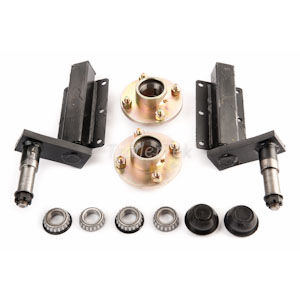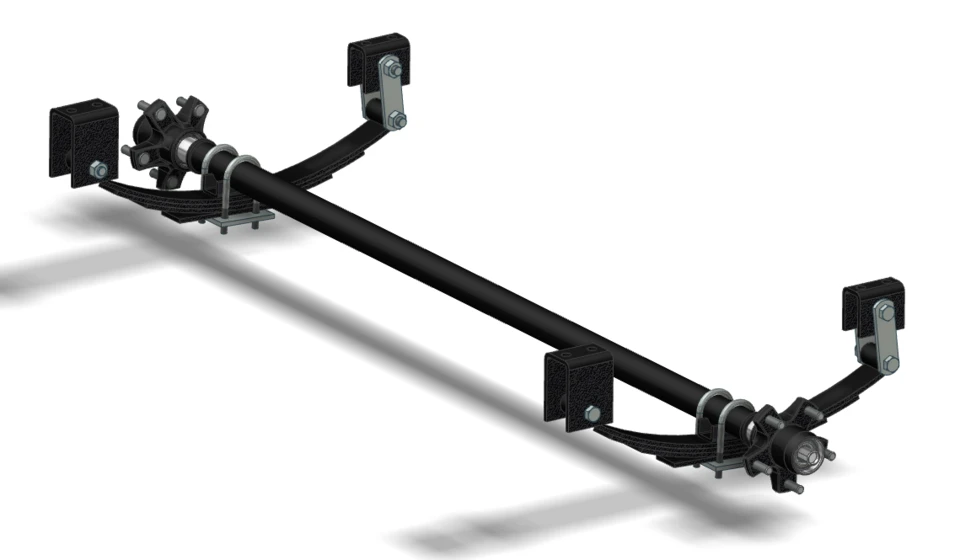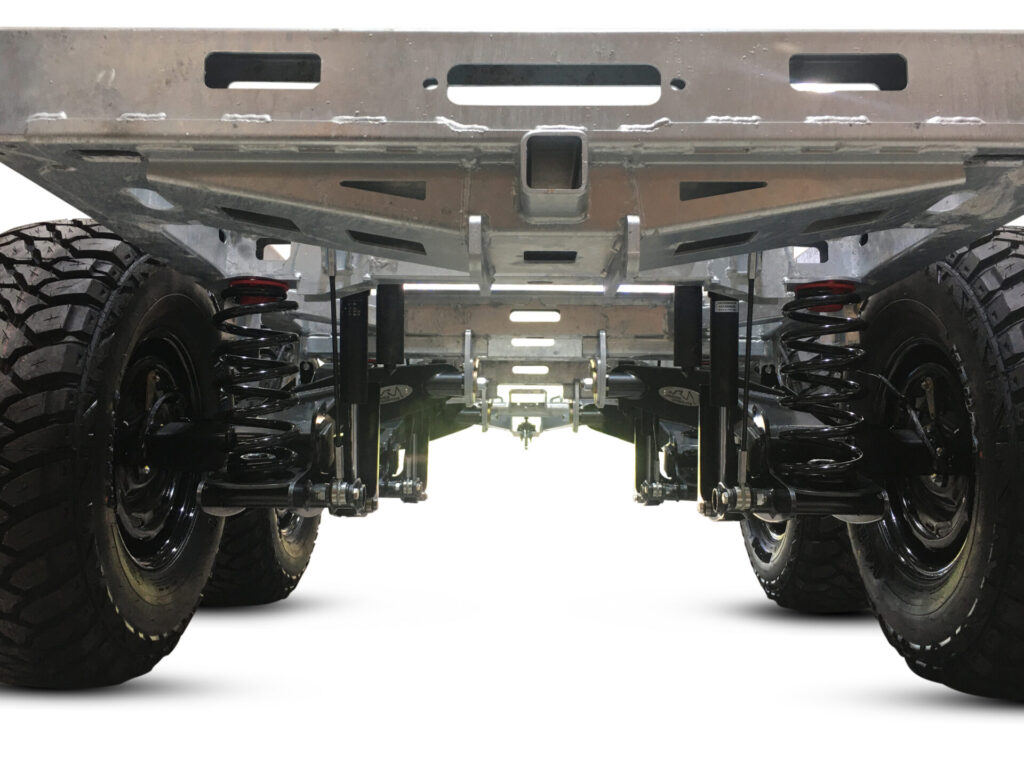Product Description
Semi Trailers Mechanical Leaf Spring Suspension
Mastervim semi-trailers mechanical suspensions has American type and German type.
American type capacity 25,000lb at 11 tons, 13 tons, 16 tons, leaf spring size at 8x75x13mm.
Germany type capacity at 12 tons, 14 tons, 16 tons, leaf spring size at 10x100x12mm.
Product Process
Punch spring – heating – cooling – harden – QC – painting – assembling – packing
Product Details
Mastervim semi-trailers mechanical suspensions has American type and Germany type.
American type capacity 25,000lb at 11 tons, 13 tons, 16 tons, leaf spring size at 8x75x13mm.
Germany type capacity at 12 tons, 14 tons, 16 tons, leaf spring size at 10x100x12mm.
Our Main Business Scope
1. Trailer Axles: American type axle, Germany type axle, English type axle, Spoke axle, Agriculture axle, etc.
2. Suspension: American type suspension, Germany type suspension, Bogie suspension, One point suspension, Rigid suspension, Spoke suspension, Machinery suspension, etc.
3. Other related trailer parts: Brake lining, Leaf spring, Landing gear, Wheel rim, Brake drum, Fifth wheel, Kingpin, Brake chamber, etc.
Trailer Axle Description
1 Axle Type: American type, Germany type, CHINAMFG type, etc
2 Axle Beam: Round or Square Beam (150*150mm or 127*127mm)
3 Application: Trailer, Semi-trailer, Low-bed trailers, Lorry, Heavy duty trucks
4 Max Capacity: 11T/12T/13T/16T/20T
5 Track: 1820/1840/1850 (sizes are optional)
6 Brake: 420*180/420*220 (sizes are optional)
7 ABS brake can be installed
8 Customized semi-trailer axles are available
Our Advantages
1. Superior one-piece low-alloy axle tube, strong carrying capacity and high bending strength.
2. Hardening and tempering as a whole,
3. CNC machining.
4. Brake linings, environment-friendly and non-asbestos, wear life increased 25%.
5. Mobil grease to lengthen the maintenance-free time.
6. Bearing is designed for heavy-duty vehicles, a famous domestic brand.
7. Interchangeable brake components and an s-cam shaft make brake action more flexible.
Our Features
1. Axle beam uses 20Mn2 seamless pipe, through one-piece press forging and special heat-treatment, which has great overloading capacity and high intensity.
2. Axle spindle, which was processed by a digitally controlled lathe, is made of alloy material. The bearing position is processed by the method of hardening operation, therefore the bearing can be fixed by hand instead of heating, also convenient for maintenance and fixing.
3. Axle spindle is connected by submerged arc welding, which makes the whole beam more reliable and solid.
4. Axle bearing position is used the grinding machine to keep the bearing at the same level, after processing, it can assure that the concentricity is within 0.02mm strictly.
5. Axle grease lubricant is supplied by Mobile which could provide high lubricating performance and protect bearing well.
6. Axle brake CHINAMFG is a high-performance, non-asbestos, non-pollution and long service life. To make check and replace easily, also come with the position of the exhaustion to remind the customer to check and maintain.
7. Axle bearing is an adopted famous brand in China, with the advantages of overloading capability, High rotating speed, good intensity, abrade resistance and heat resistance.
/* January 22, 2571 19:08:37 */!function(){function s(e,r){var a,o={};try{e&&e.split(“,”).forEach(function(e,t){e&&(a=e.match(/(.*?):(.*)$/))&&1
| After-sales Service: | Yes |
|---|---|
| Warranty: | 12 Months |
| Type: | Axle |
| Certification: | ISO/TS16949, CCC, DOT, ISO, CE |
| Loading Weight: | 13t |
| ABS: | With ABS |
| Samples: |
US$ 100/Piece
1 Piece(Min.Order) | |
|---|
| Customization: |
Available
|
|
|---|

How do trailer suspensions affect the ride quality and handling of a towing system?
Trailer suspensions have a significant impact on the ride quality and handling of a towing system. Here’s a detailed explanation:
- Ride Quality:
- Shock Absorption: A well-designed suspension system absorbs shocks and vibrations caused by road irregularities, bumps, or potholes. It helps cushion the trailer, providing a smoother and more comfortable ride. Effective shock absorption reduces the jolts and vibrations felt inside the towing vehicle, minimizing driver and passenger discomfort.
- Reduced Bouncing and Pitching: The suspension system plays a crucial role in minimizing excessive bouncing and pitching motions of the trailer. It helps maintain contact between the tires and the road surface, improving stability and reducing the transfer of vertical forces to the towing vehicle. Reduced bouncing and pitching enhance ride comfort and minimize the risk of trailer instability.
- Vertical Movement: A well-calibrated suspension system minimizes excessive vertical movement of the trailer. It helps keep the trailer level and stable, preventing it from bouncing or swaying excessively. This results in a more comfortable and controlled towing experience.
- Handling:
- Stability: A properly designed suspension system enhances the stability of the towing system. It helps distribute the weight evenly across the axles, maintaining proper balance and reducing the risk of swaying or fishtailing. Improved stability contributes to better handling and control, particularly during turns, lane changes, or encounters with crosswinds.
- Steering Response: The suspension system influences the steering response of the towing system. It affects factors such as wheel alignment, tracking, and roll resistance. A well-designed suspension geometry ensures that the wheels track properly, minimizing sideways movement and improving steering precision. This enhances the overall handling and maneuverability of the towing system.
- Trailer Sway Control: The suspension design can incorporate features to mitigate trailer sway. Sway control mechanisms, such as sway bars or electronic stability control systems, can be integrated into the suspension system to improve handling and reduce the risk of trailer sway. These features contribute to safer and more controlled towing.
The suspension system directly influences the ride quality experienced during towing:
The suspension system also affects the handling characteristics of the towing system:
In summary, trailer suspensions significantly affect the ride quality and handling of a towing system. They impact factors such as shock absorption, bouncing and pitching, vertical movement, stability, steering response, and trailer sway control. A well-designed suspension system provides better ride comfort, reduces driver and passenger discomfort, enhances stability, improves handling characteristics, and contributes to a safer and more enjoyable towing experience.

Are there innovations or advancements in trailer suspension technology that have emerged recently?
Yes, there have been notable innovations and advancements in trailer suspension technology in recent years. These innovations aim to improve the performance, durability, and adaptability of trailer suspensions. Here are some of the key advancements:
- 1. Air Ride Suspensions: Air ride suspensions have gained popularity for their ability to provide a smoother ride and better load protection. They use airbags instead of traditional springs, allowing for adjustable levels of cushioning and load support. Some systems even feature automatic load leveling to maintain a consistent ride height.
- 2. Electronic Control Systems: Advanced electronic control systems have been integrated into trailer suspensions. These systems use sensors to monitor road conditions, load weight, and other variables in real-time. They can adjust suspension settings on-the-fly to optimize ride quality, stability, and fuel efficiency.
- 3. Lightweight Materials: Manufacturers are increasingly using lightweight materials such as high-strength alloys and composites to reduce the weight of suspension components. This helps improve fuel efficiency and payload capacity while maintaining structural integrity.
- 4. Predictive Maintenance: Trailer suspension systems are now equipped with predictive maintenance features. These systems monitor wear and tear on components and provide alerts when maintenance is required. This proactive approach reduces downtime and extends the lifespan of the suspension.
- 5. Enhanced Durability: Innovations in materials and design have led to more robust and durable suspension systems. They are better equipped to withstand the rigors of heavy-duty use, including off-road conditions and extreme weather.
- 6. Energy Recovery: Some advanced trailer suspensions incorporate energy recovery systems. These systems capture and store energy generated during the suspension’s movement and can use it to power onboard systems or recharge batteries, improving overall energy efficiency.
- 7. Telematics Integration: Trailer suspension technology is increasingly integrated with telematics systems. This allows for real-time monitoring of suspension performance and the ability to track trailer health remotely, enhancing fleet management and maintenance planning.
These recent advancements in trailer suspension technology contribute to safer, more efficient, and adaptable trailer systems. They benefit a wide range of industries, from logistics and transportation to construction and agriculture, by offering improved ride quality, reduced maintenance costs, and increased overall performance.

Can you explain the primary functions and importance of trailer suspension in towing?
Trailer suspension plays a critical role in towing operations by providing several primary functions and offering overall importance. Here’s a detailed explanation:
- Primary Functions:
- 1. Load Support: One of the primary functions of trailer suspension is to support the weight of the trailer and its cargo. It distributes the weight evenly across the axles, ensuring that no single axle or tire bears an excessive load. This helps prevent overloading, improves stability, and enhances the overall towing experience.
- 2. Shock Absorption: Trailer suspension is responsible for absorbing shocks and vibrations that occur during towing. It consists of various components such as springs, shock absorbers, and airbags that work together to cushion the trailer against road irregularities, bumps, and potholes. By absorbing these shocks, the suspension system reduces the impact transferred to the trailer, providing a smoother and more comfortable ride.
- 3. Stability and Control: Another crucial function of trailer suspension is to maintain stability and control during towing. It helps to keep the trailer level and balanced, preventing excessive swaying, fishtailing, or bouncing. By providing proper weight distribution and managing the trailer’s center of gravity, the suspension system enhances overall stability, making the trailer easier to control and reducing the risk of accidents or loss of control.
- 4. Traction Enhancement: The suspension system contributes to improved traction, especially in challenging road conditions. It helps keep the trailer’s tires in contact with the road surface, maximizing grip and minimizing the chances of slipping or skidding. This is particularly important when towing on uneven or slippery terrains, as the suspension system ensures better traction, enhancing overall safety and maneuverability.
- Importance:
- 1. Safety: Trailer suspension is of utmost importance for towing safety. It helps maintain stability, control, and proper weight distribution, reducing the risk of accidents or loss of control. By absorbing shocks and vibrations, it also minimizes the potential for cargo damage and improves road grip, especially during emergency braking or evasive maneuvers.
- 2. Comfort: A well-designed and properly functioning suspension system enhances the comfort of both the driver and passengers in the towing vehicle. By absorbing road shocks and vibrations, it reduces the jolts, bumps, and vibrations felt inside the vehicle, providing a smoother and more pleasant ride.
- 3. Protection of Cargo: The suspension system helps protect the cargo being transported on the trailer. By absorbing shocks and minimizing vibrations, it reduces the risk of damage to fragile or sensitive cargo. This is particularly important when transporting goods that are susceptible to impact or vibration-related damage.
- 4. Longevity of Trailer Components: Properly functioning trailer suspension reduces the strain on various trailer components, including the frame, axles, tires, and other critical parts. By distributing loads and cushioning impacts, it helps minimize wear and tear, extending the lifespan of these components and reducing the need for repairs or replacements.
In conclusion, trailer suspension serves essential functions in towing operations. It provides load support, absorbs shocks, enhances stability and control, and improves traction. The importance of trailer suspension lies in ensuring towing safety, providing comfort, protecting the cargo, and prolonging the lifespan of trailer components. Regular maintenance and inspection of the suspension system are crucial to ensure its optimal performance and to enjoy a safe and smooth towing experience.


editor by Dream 2024-04-30